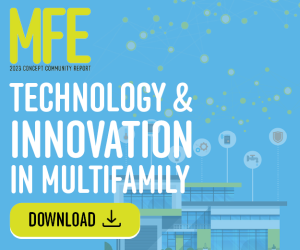
As the nation hit the one-year mark of COVID-19 pandemic lockdowns, two multifamily leaders shared lessons learned over the past year and what’s ahead for the future during last week’s Multifamily Executive Virtual Summit.
“What I think has changed is how we’re going to address different things in the future,” says Sue Ansel, CEO of Gables Residential. “What impressed me most as an industry, we are much more resilient than I ever thought possible.”
With three days’ notice last spring, companies went from working in a corporate environment to working at home without missing beat, and that should be a lesson that the industry is much better able to address challenges than it had previously given itself credit for, she says.
“We spend a lot of time beta-testing things and trying things without jumping in with both feet,” Ansel says. “We’ve been too conservative and need to cut that cord to try new things.”
Communication with staff and residents has taken on more importance over the past year.
“I learned something important about leadership. We couldn’t communicate enough with our associates. They wanted it desperately,” says Todd Farrell, president of Lennar Multifamily Communities. “Words matter and touch points matter more than I ever thought before.”
Ansel says Gables also proactively reached out with a soft touch program to check in to see how residents were doing and if they needed assistance. In addition, the apartment owner and operator has looked to bring in activities, such as live music, food trucks, and exercise in the courtyard, and has recognized that, while amenity space is being used differently, it’s still important for residents working from home.
“Being in your four white wall box for residents and their families is difficult over time, so we looked at how we can work within the guidelines and regulations to meet our residents’ needs,” she says.
Farrell says LMC also has been active in providing virtual events for residents.
“Building community got really accelerated when everyone was home all the time, even though they couldn’t be together,” he says. “We have done a lot and try to pull people together.”
While most of Gables’ corporate offices have been open since early June with associates on a rotating basis and LMC not fully being back to the corporate office yet, both Ansel and Farrell say it will be important to bring staffs back together.
“This next generation that is coming up needs the work ethic and work habit. But it’s more than that, it’s the collaboration and the idea generation that comes with being together,” says Farrell. “I think all of America will have an interesting transition period as herd immunity and vaccines get to a higher number and all the companies say, ‘come on back.’”
Ansel adds that different roles and different responsibilities require different things.
“For our on-site teams, they are essential, and we can’t thank them enough for what they have done. Frankly, one of the things we are reminded about is how important face-to-face and mask-to-mask communication is and the importance of that human interaction,” she says. “We have tried to be creative in ways to continue to provide that even though the working situations are different for different roles.”
Both executives referred to themselves as “road warriors,” and they expect to return to the road. However, travel budgets will be reduced.
“Travel has changed, and we have demonstrated that we can do a lot of things with Zoom calls,” says Ansel. “The amount of travel we will do in the future will be a lot less than in the past. However, you can’t underestimate the value of face-to-face interaction with each other. It’s important for culture and creativity.”
Farrell adds that site and construction teams need to see leadership.
“Real estate happens where it is and not where you are,” he says. “I think our teams need to see us, and we need to see the properties. We’ve got to get back out there.”
Farrell adds that time only will show how many of the changes made over the past year will stick.
“I’m not sure everything is permanently changed. It seems that when one event causes a sea change in human behavior and you take away that event, like 9/11, behavior sometimes goes back to where it was,” he says.









